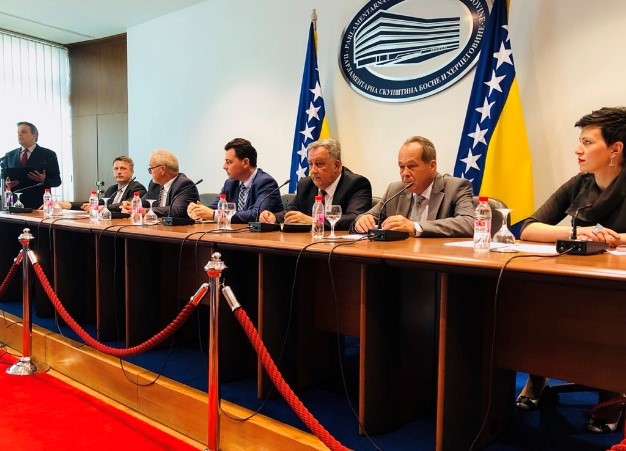
In a normally contentious pre-election period, when the focus of Members of Parliament (MPs) typically shifts from efforts at passing legislation to getting reelected, a group of MPs in Bosnia and Herzegovina (BiH) are proving that collaboration and progress are still possible.
In February, the Consortium for Elections and Political Process Strengthening (CEPPS is a consortium of organizations dedicated to strengthening democracy through partnership) and IRI established the European Integration and Security Caucus (EISC), a multi-party, issue-based caucus in the BiH Parliamentary Assembly. The diverse group is made up of 14 MPs from 12 parties who are committed to improving interparty coordination on matters of European integration and national security. Members of the EISC have found common ground over improving multi-party coordination on policy development around key domestic security issues and the country’s Euro-Atlantic integration process.
The May announcement of the October 7 general elections threatened the stability of the Caucus. Because mandatory official committees struggle to reach quorum during pre-election periods, IRI/CEPPS feared that participation in the voluntary caucus would also suffer. Moreover, the incentives for cooperation, particularly across party lines, are low when the goal is reelection. In any election season, bi-partisan efforts are low. However, this is particularly magnified in BiH’s political environment where parties are largely centered around ethnic identity.
However, the MPs selected for the EISC continued to participate after the announcement of elections. Caucus parliamentarians also seized the opportunity to publicly condemn and discourage hate speech in electoral campaigns, a recurring problem in the country’s national elections that exposes the still-raw wounds of ethnic division, even 23 years after the Dayton Accords marked the official end of the Bosnian War.
On May 10, five MPs – Jasmin Emrić, Maja Gasal-Vrazalica, Mirsad Isaković, Momčilo Novaković, Saša Magazinović and a House of Peoples delegate, Sifet Podžić – publicly released a “Joint Declaration of the European Integration and Security Caucus Against Hate Speech During the Pre-Election Period” on behalf of the EISC. In their statement, the MPs referenced the Declaration on Condemnation of Hate Speech, adopted in May 2016, by the BiH Parliamentary Assembly, the Federation of Bosnia and Herzegovina (FBiH) Parliament and the Republika Srpska (RS) National Assembly, and invited:
- All institutions of Bosnia and Herzegovina to implement laws and judicial authorities to make maximum efforts in accordance with their legal competence to prevent and sanction hate speech;
- Political parties and candidates in the upcoming elections and public office holders to use moderate rhetoric during a pre-election campaign that will not spread, encourage or promote hate speech;
- Media to combat hate speech and false news through fair and objective reporting and to convey content that will not contain xenophobic, anti-Semitic or other forms of hatred based on intolerance. To maximally control their content being aware of their public roles and influence on the public, and the regulatory bodies for print and electronic media to sanction such incidences;
- Citizens to refrain from any form of hate speech, to act proactively and take responsibility and report to the competent authorities and institutions every hate speech they notice and recognize in public space.
In this joint effort, the MPs pledged to invest in their parties to prevent, discourage and condemn hate speech, to encourage moderate pre-election rhetoric and help foster a safe and secure democratic environment during the elections. Media outlets and news portals, including BH TV, Dnevni List, FACE TV, N1 News, HYAT and SRNA, broadly covered the statement.
The joint statement sent a message to the public that leaders will work across parties and cooperate on important issues despite a current climate where consensus is challenging. The joint declaration marked EISC’s first public appearance and publicly displayed their commitment to collaboration.
CEPPS/IRI’s approach largely influenced the success in building an active interparty Caucus. First, CEPPS/IRI deliberately selected moderate MPs who are interested in security topics to join the Caucus, rather than incorporating more divisive members who might be destructive rather than constructive. CEPPS/IRI has acted as a neutral convener, treating all the parties and their MPs equally. Rather than focusing on controversial, hot-button issues at the outset, CEPPS/IRI encouraged the group to identify a common set of issues they could all agree to prioritize. As a result, the EISC identified a set of four topics of focus: mitigating hate speech, combating cybercrime, fighting terrorism and radicalization, and managing increased migration.
Finally, CEPPS/IRI provide logistical and knowledge support to the Caucus, ensuring that it runs smoothly and productively. An efficient caucus ensures MPs can show up, participate and create concrete results. CEPPS/IRI also have helped form a network of MPs, promoting the exchange of ideas and knowledge.
A healthy, functioning domestic political system in BiH is very much a key to wider regional stability. These cross-party initiatives challenge political leaders to think beyond the traditional political silos developed in the wake of the bloody interethnic conflicts of the 1990s. As such, IRI is committed to supporting cross-party cooperation and will continue to champion BiH’s democratic development.
Top